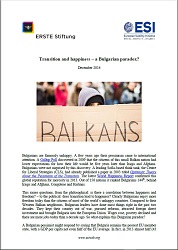TRANSITION AND HAPPINESS – a Bulgarian paradox?
TRANSITION AND HAPPINESS – a Bulgarian paradox?
Author(s): Author Not Specified
Subject(s): Civil Society, Transformation Period (1990 - 2010)
Published by: ESI – European Stability Initiative
Keywords: Transformation in Bulgaria;
Summary/Abstract: Bulgarians are famously unhappy. A few years ago their pessimism came to international attention. A Gallup Poll discovered in 2009 that the citizens of this small Balkan nation had lower expectations for how their life would be five years later than Iraqis and Afghans. Bulgarians were not surprised by this discovery. A leading Sofia-based think tank, the Centre for Liberal Strategies (CLS), had already published a paper in 2003 titled Optimistic Theory about the Pessimism of the Transition. The latest World Happiness Report confirmed this global reputation for morosity in 2013. Out of 156 nations it ranked Bulgarians 144th, behind Iraqis and Afghans, Congolese and Haitians. || This raises questions, from the philosophical: is there a correlation between happiness and freedom? – to the political: does transition lead to happiness? Clearly Bulgarians enjoy more freedom today than the citizens of most of the world’s unhappy countries. Compared to their Western Balkan neighbours, Bulgarian leaders have done most things right in the past two decades. They kept their country out of war, pursued reforms, attracted foreign direct investment and brought Bulgaria into the European Union. Wages rose, poverty declined and there are more jobs today than a decade ago. So what explains this Bulgarian paradox?
Series: ESI Discussion Papers
- Page Count: 4
- Publication Year: 2014
- Language: English
- Content File-PDF

